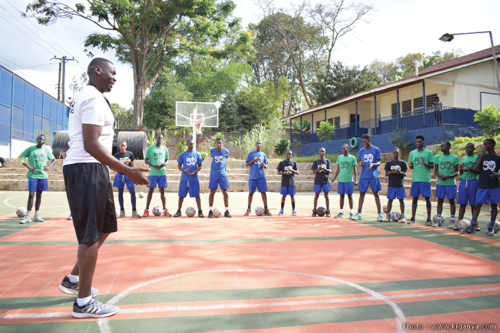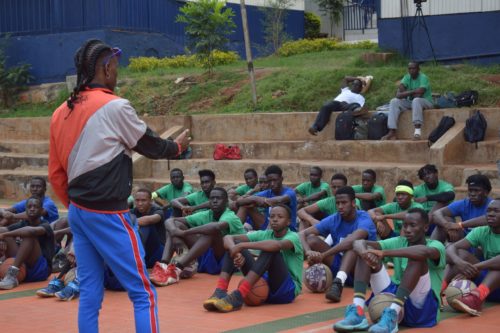
“The goal is to create our own heroes. Local heroes.”
These are the words of Peter Kiganya, the CEO and founder of the Hope Basketball Tour – a multi-faceted program involving Kenyan youth looking to make their dreams come true one dribble at a time. Since 2013, he’s been hosting basketball camps all over Kenya while empowering youth to pursue their dreams and seize opportunities, whether they’re related to sport or not. It’s an idea that’s caught on, resulting in quality sport basketball programs being held in Tanzania, Uganda, and the United States.
“For me, this is a way of giving back. There was nothing special about me growing up. I wasn’t the most talented; I was just one of the kids. Everything I’ve achieved happened because of my basketball scholarship. I was able to get two Master’s degrees and travel the world through basketball. When I talk to the kids about hope, it’s about what you can control. It’s not just about basketball, it’s about everything they do in school and life,” said Kiganya.
“Basketball is the vehicle to get all the kids together, and to give them hope that tomorrow will be a better day.”
The Hope Basketball Tour came to fruition in 2013, when Kiganya donated balls and uniforms to a fledgling program. He was then flooded with requests from local coaches who were facing challenges and needed help. Through a series of conversations with coaches in his country, the Hope Tour was born. The idea of the tour was to host annual camps in different cities in Kenya. During the first tour they gave away over 600 pounds of equipment, uniforms and shoes and visited Nairobi, Kisumu, Nakuru and Yala with the support of Nairobi International School (NIS) and the Kenya Diaspora Sports Organization.
By the time the tour reached the second iteration of the tour, the program’s leadership had partnered with the Kenya Academy of Sports (KAS) to bring together 50 girls and 50 boys under the age of 18 from different parts of the country. The participants assembled at Jomo Kenyatta University of Agriculture and Technology (JKUAT) for a three-day camp dubbed the Top 50 Basketball Camp and received mentorship from some of the best coaches in the country. Each participant received a basketball thanks to a donation from Jamie Merrill, a musician residing in Austin, Texas.
After identifying their top 50 players from across the country, they then chose 10 elite players to support in seeking scholarships – putting them on the path to making the national team, or an even higher level, before inviting them back to speak to the younger generation. Through the COVID-19 pandemic, they also helped kids with meals, created Christmas care packages and provided them with essential support for their life outside basketball, taking a holistic approach to their Long-Term Development.
“We believe in identifying and exposing our youth. This is the age we need to prepare youth for a better representation of Kenya at the international level. We teach them to work hard and play harder. Our camp supports kids at the grassroots level to see what they can do, and brings together a lot of talent, a lot of culture, and a lot of different dimensions of basketball,” he said.
One of the barriers they’re facing is a lack of appropriate playing surfaces in the country.
“We don’t have enough basketball courts in Kenya, or the ones we have are worn out and not
in good condition. Markings and lines are not visible, there’s grass and shrubs growing, and they haven’t been paved well. So we started a program named ‘Adopt-a-Court’ looking for people to adopt the courts in their neighbourhoods and help maintain them for the kids,” he said.

“It was something concrete for sponsors in terms of an ask: we want to fix a court and do A, B, C, rather than just asking for help.”
When working with his players, an aspect that is crucial to Kiganya is teaching life skills.
“We talk about goal setting, and what does it mean? What steps should you take to reach a goal? What about setbacks? We ask them, how do you pursue a balance of family and support, and how do you communicate your journey to your family? It’s doable, it can be done, and people have done it – so why not you?” he said.
“Even if you don’t make it as a player, your calling may be to help the sport in a different way.”
According to Kabir Hosein, Sport for Life’s Director of Strategic Initiatives, the Hope Basketball Tour is an example of quality sport programming.
“Quality sport based on Long-Term Development in Sport and Physical Activity is developmentally appropriate, safe, inclusive and well run. This leads to individual excellence and optimum health. Peter Kingaya and his program are true proponents of the principles of quality sport,” he said.
“The Hope Tour was presented at the Sport for Life 2021 Virtual Summit and since then, under Peter’s continued leadership, it has grown from strength to strength.”
